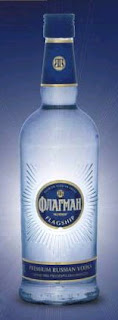Applying Doctrine of Foreign Equivalents, TTAB Finds "AMMIRAGLIA" and "FLAGSHIP" Confusingly Similar for Booze
Affirming a Section 2(d) refusal, the Board found Applicant's mark AMMIRAGLIA for "wines, sparkling wines, liqueurs," likely to cause confusion with the registered mark FLAGSHIP for vodka. The Board concluded that AMMIRAGLIA means flagship in Italian, and it found no evidence that AMMIRAGLIA would not be translated by the ordinary American purchaser who is knowledgeable in the English and Italian languages. In re Marchesi de’ Frescobaldi Societa’ Agricola S.p.A., Serial No. 79021733 (August 11, 2008) [not precedential].

Relying on five third-party registrations that cover both vodka and wine or liqueurs , the Board found the goods of the parties to be related. Applicant did not contest this issue. The Board further found that the goods travel in the same channels of trade to the same classes of consumers.
Applicant focused its argument on the differences in the marks and contended that AMMIRAGLIA is an obscure word in the Italian language, with several possible meanings, and would not be translated into the English language. The Examining Attorney maintained that there was no evidence either that AMMIRAGLIA is an obscure term or that it is subject to numerous translations.He argued that the evidence of record “clearly shows that AMMIRAGLIA translates exactly to "flagship."
The Board observed that "while the doctrine of foreign equivalents is not an absolute rule, it is accepted that 'words from modern languages are generally translated into English.'" The Board found that that Italian is a modern language that is not obscure. "We further find that every translation made of record ... agrees that AMMIRAGLIA means flagship." Moreover, Applicant provided no evidence to support its contention that AMMIRAGLIA would be unlikely to be translated by the ordinary American purchaser who is knowledgeable in the English and Italian languages.
"The fact that the marks AMMIRAGLIA and FLAGSHIP have the same meaning, resulting in a highly similar overall commercial impression, is sufficient for us to conclude that confusion is likely, despite the differences in their appearance and sound."
The Board then turned to a second 2(d) refusal of Applicant's mark and reversed the refusal, finding AMMIRAGLIA not confusingly similar to the word-and-design mark shown immediately below, again for vodka. Here the identity of AMMIRAGLIA and FLAGSHIP "is outweighed in the context of the additional material in the mark, in particular the Cyrillic Russian characters, other English wording, and design elements."
 As a result, confusion is not likely, and the second refusal cannot stand.
As a result, confusion is not likely, and the second refusal cannot stand.Text Copyright John L. Welch 2008.




0 Comments:
Post a Comment
<< Home